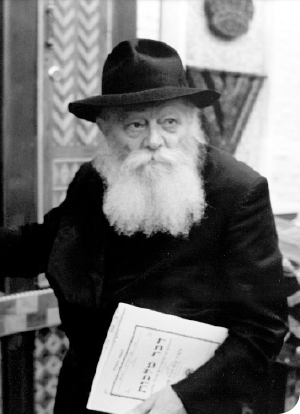Chapter 16 of Rabbi Shloma Majeski’s Likkutei Mekoros, Volume 2, responds to the questions: Where does the Rebbe explain why he refers to the Previous Rebbe when he actually means himself? Where does the Rebbe state that he and the Previous Rebbe are one and the same? (Underlined text is the compiler’s emphasis)
Translated by Boruch Merkur
 […] My father in-law, the Rebbe, told the virulent atheist that for him [for the Rebbe] there are two worlds. That is, the Rebbe experiences the spiritual state of “you shall behold your world in your lifetime.” Even in such a place [i.e., a Communist stronghold] and while speaking with such a person, the Rebbe revealed and drew down the aspect of “min ha’olam v’ad ha’olam,” two worlds.
[…] My father in-law, the Rebbe, told the virulent atheist that for him [for the Rebbe] there are two worlds. That is, the Rebbe experiences the spiritual state of “you shall behold your world in your lifetime.” Even in such a place [i.e., a Communist stronghold] and while speaking with such a person, the Rebbe revealed and drew down the aspect of “min ha’olam v’ad ha’olam,” two worlds.
The latter concept is reflected in what is explained elsewhere regarding Moshe Rabbeinu – that although he is a soul from Atzilus [the highest of the four worlds – for the sake of fulfilling his mission to redeem the Jewish people] he engaged in dialogues with Pharaoh, King of Mitzrayim, who was extreme in his opposition to G-dliness. In fact, Pharaoh went so far as to say, “The Nile is mine and I have made myself”; he was so arrogant that he conceived of himself as “I am, and there is none but me.” Pharaoh’s mindset was even more wicked than that of Sancheriv, who scorned and cursed, etc., as explained at length in the discourse of the Tzemach Tzedek T’ar HaS’chira. Yet even in the wicked domain of Pharaoh, Moshe Rabbeinu drew down the aspect of Atzilus.
This approach is likewise apparent in my revered father in-law, the Rebbe, whose freeing from prison we celebrate. Even when he was incarcerated in Spalerka, speaking with someone who was totally opposed to G-dliness, even there he drew down and revealed “min ha’olam v’ad ha’olam,” two worlds.
My revered father in-law, the Rebbe, is Nasi Doreinu (Leader of the Generation, in a manner similar to how they granted kingship to Shlomo, proclaiming, “Eternal life…to King Dovid” (see at length the address of 12 Tammuz of this year, Section 8 ff.). He grants to all those who walk in his path this capacity to reveal G-dliness in the face of opposition.
)From the address of Shabbos Parshas Balak, 17 Tammuz 5745; Hisvaaduyos, pg. 2524-5(